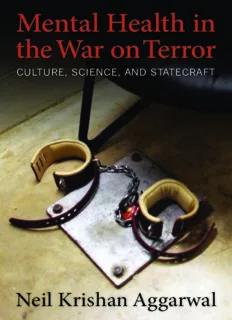
Mental Health in the War on Terror: Culture, Science, and Statecraft PDF
Preview Mental Health in the War on Terror: Culture, Science, and Statecraft
Mental Health in the War on Terror CULTURE, SCIENCE, AND STATECRAFT Neil Krishan Aggarwal MENTAL HEALTH IN THE WAR ON TERROR Mental Health in the War on Terror CULTURE, SCIENCE, AND STATECRAFT Neil Krishan Aggarwal columbia university press(cid:18) new york COLUMBIA UNIVERSITY PRESS Publishers Since 1893 New York Chichester, West Sussex cup.columbia.edu Copyright © 2015 Columbia University Press All rights reserved Library of Congress Cataloging-in-Publication Data Aggarwal, Neil Krishan, author. Mental health in the war on terror : culture, science, and statecraft / Neil Krishan Aggarwal. p. ; cm. Includes bibliographical references and index. ISBN 978-0-231-16664-5 (cloth : alk. paper) — ISBN 978-0-231-53844-2 (e-book) I. Title. [DNLM: 1. Mental Health—ethnology—United States. 2. Bioethical Issues—United States. 3. Prisoners of War—psychology—United States. 4. Terrorism—psychology—United States. 5. Veterans—psychology—United States. WA 305 AA1] RC451.4.p7 616.890086'97—dc23 2014020991 Columbia University Press books are printed on permanent and durable acid-free paper. This book is printed on paper with recycled content. Printed in the United States of America c 10 9 8 7 6 5 4 3 2 1 Cover design: Milenda Nan Ok Lee Cover image: © AP Photo/Brennan Linsley References to websites (URLs) were accurate at the time of writing. Neither the author nor Columbia University Press is responsible for URLs that may have expired or changed since the manuscript was prepared. The question or questions that have to be asked are: “What types of knowledge are you trying to disqualify when you say that you are a science? What speaking subject, what discursive subject, what subject of experience and knowledge are you trying to minorize when you begin to say: ‘I speak this discourse, I am speaking a scientific discourse, and I am a scientist.’ What theoretico-political vanguard are you trying to put on the throne in order to detach it from all the massive, circulating, and discontinuous forms that knowledge can take?” —Michel Foucault, Society Must Be Defended contents preface(cid:18)IX acknowledgments(cid:18)XI chapter one (cid:2) Mental Health, Culture, and Power in the War on Terror(cid:18)1 chapter two (cid:2) Bioethics and the Conduct of Mental Health Professionals in the War on Terror(cid:18)30 chapter three (cid:2) The Meanings of Symptoms and Services for Guantánamo Detainees(cid:18)53 chapter four (cid:2) Depictions of Arabs and Muslims in Psychodynamic Scholarship(cid:18)83 chapter five (cid:2) Depictions of Suicide Bombers in the Mental Health Scholarship(cid:18)107 chapter six (cid:2) Knowledge and Practice in War on Terror Deradicalization Programs(cid:18)133 epilogue(cid:18)157 notes(cid:18)163 references(cid:18)173 index(cid:18)205 preface foucault’s penetrating insights into the connections between knowledge and power, between science and politics, have gripped me since the declaration of the War on Terror. I entered medical school in 2000 and watched the 9/11 attacks unfold on live television. As I attended medical conferences, I began perceiving the creeping influence of politics within academic discussions: bioethicists debated the philosophical grounds for torture, and psychiatrists conjectured about the irrational motivations of suicide bombers. Medical scientists placed certain theoretico-political vanguards related to national security on the throne of science at this ex- ceptional moment of American history. What perspectives were becoming “minorized” and “majorized” in the War on Terror, and how did these per- spectives immortalize cultural values, beliefs, and orientations as scientific knowledge? In a broad sense, how has the War on Terror changed medi- cine, and how has medicine changed the War on Terror? The goal of this book is to analyze the cultural meanings of mental health knowledge and practice produced throughout the War on Ter- ror. My frameworks for studying the interrelationships of mental health, culture, and power come primarily from cultural psychiatry and medical anthropology. Central to both disciplines is the tenet that medical sys- tems are cultural systems with beliefs, behaviors, and meanings transacted among individuals in social institutions. I aim to show through a wide array of materials that we can study medical systems in the War on Ter- ror as cultural systems. These source materials include government docu- ments; reports and position papers from nongovernmental organizations; legal files such as charge sheets, motions, rulings, and transcripts; direct and
Description: